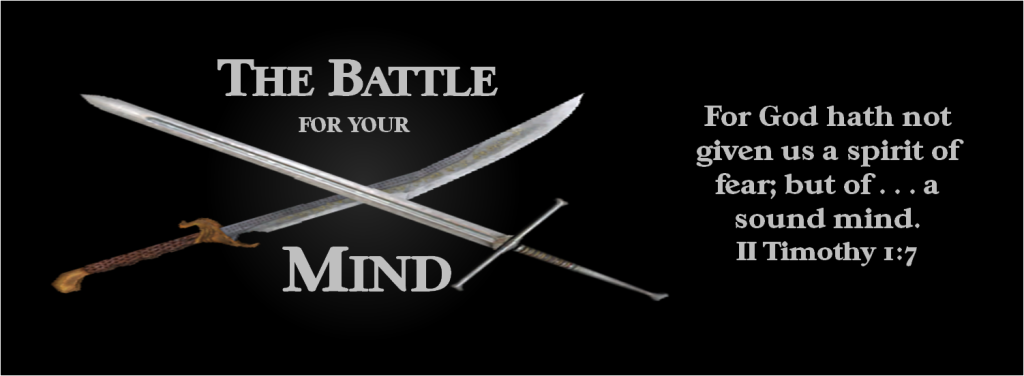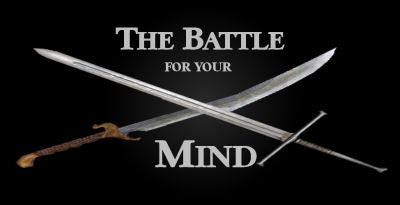This is the eighth post in the “Battle for Your Mind” series. Click here to view the previous post.
THE BATTLE FOR YOUR FAITH
HOW TO DEVELOP FAITH
In the previous section we watched as 276 people endured a devastating shipwreck. The sailors and soldiers on board were scared to death and despaired, but Paul was able to be calm.
Why? He had faith in a promise God had given to him.
The question is, how did Paul get to the point where he could believe God even though he couldn’t see the means God would use? After all, how could 276 people live through a shipwreck? Even if they did survive the initial wreck, how would they all make it to shore? Wherever they landed, how would they get word back so someone could rescue them? Surely their cell phones would become damaged in the water!
Paul could have had all kinds of questions, but that didn’t matter to him. God told him that he would appear before Caesar and that all the people on board the ship would live. That was good enough for him.
God may not have informed you that you will survive a shipwreck, but He has given you some promises. However, sometimes we fail to be able to rest in them. How can we get the kind of faith that Paul had?
Faith develops through examination
So then faith cometh by hearing, and hearing by the word of God. (Romans 10:17)
While this passage in Romans specifically refers to saving faith, I think it is true for any faith.
It is commonly said that if you hear something enough you will begin to believe it. It is no wonder, then, that people who neglect reading the Bible struggle with faith. What God put in the Bible, He put there for a reason. It is also important to be in church and to read good books helping to explain the Bible.
We could just say that faith develops through “hearing,” but I am using the word “examination” because simply allowing something to enter our ears is not enough. God has given to each of us a brain, and we need to put it into gear and examine what we hear. Once we do, we will see that our faith is not blind. God’s message has plenty of supporting evidence that can be found in creation.
Once we have examined the words of God, we can begin to practice faith. It may be difficult at first, but it will become easier through experience.
Faith develops through experience
Every year of my childhood when winter came in full force, the bayou on which I lived would ice over. It wouldn’t be long before all the local fishermen would venture out on the ice to take advantage of an extended fishing season. If you have never walked on a frozen like, you are missing quite an experience.
The most important piece of equipment for the first trip of the season onto the ice is a spud. A spud looks like a heavy tomahawk with a sharp end. It is used for checking the strength of the ice. Take a step, chip the ice with the spud. Take another step or two, check the ice again. You never know where there will be a weak spot. The first trip out may seem a little intimidating, but once you know the ice is solid you can walk without fear.
That is what faith is all about. At first you may need to timidly venture out, verifying every step. However, once the object of your faith has proven itself, you begin to wonder why you ever doubted in the first place.
Experience makes it easier.
How could Paul have such great faith in God’s promise even when he did not know how God would pull it off? It was because of his past experience. He had seen God make good on promises in the past, so why would this time be any different?
Can you look back on your life and see any places that God has come through for you? Do you think He can do it again?
There are times, unfortunately, when we just cannot seem to develop the feeling of trust. These are times when we just have to accept that we don’t understand.
Faith develops through acceptance
Occasionally we have to accept the fact that we will not be able to understand everything. Faith then becomes an act of the will rather than a feeling.
Everyone knows who Billy Graham is. Whether you agree with everything he said or not, very few will argue that God used him in a great way throughout his long ministry. He preached the message of the Bible without apology before more people than most of us will ever see in our lifetime.
However, what you may not know is back at the very beginning of his ministry, he experienced a severe crisis of faith.[pullquote align=”right” textalign=”left|center|right” width=”30%”]Sometime you won’t have all the answers. If you wait until you do, you’ll never have faith.[/pullquote]
The year was 1949. Thirty-year-old Billy Graham was undergoing an intense struggle in his life. He was doing some evangelistic preaching while also serving as the president of a college and seminary. He had just preached a crusade in Altoona, PA, that seemed to him to be a miserable failure. He was struggling with leaving evangelism totally to devote himself to education. But then he also knew that his skills were not the greatest in education.
Additionally and more importantly, he had a very good friend, Chuck Templeton, who was also a dynamic evangelist. Chuck had resigned his church to attend Princeton, where he began to seriously doubt the authority of the Bible. He eventually became an atheist. He shared his doubts with Billy and as Billy listened to him and read books by theologians who did not believe in the inspiration of the Bible, he began to be very confused.
He was scheduled to preach at a crusade in Los Angeles, but he struggled with his failure in Altoona as well as his own doubts about God’s Word.
During all of this, both he and Chuck Templeton were scheduled to speak at a conference. Chuck tried pulling him away from the Scriptures, while Henrietta Mears, the director of the conference, tried to help him have more faith. He knew that if he could not trust the Bible he would have to resign his position as the president of the Bible college and he would have to stop preaching.
Here is a description in Billy’s own words of what happened the night that proved to be the turning point in his life:
“I got up and took a walk. The moon was out. The shadows were long in the San Bernardino Mountains surrounding the retreat center. Dropping to my knees there in the woods, I opened the Bible at random on a tree stump in front of me. I could not read it in the shadowy moonlight, so I had no idea what text lay before me. Back at Florida Bible Institute, that kind of woodsy setting had given me a natural pulpit for proclamation. Now it was an altar where I could only stutter in prayer.
“The exact wording of my prayer is beyond recall, but it must have echoed my thoughts: ‘O God! There are many things in this book I do not understand. There are many problems with it for which I have no solution. There are many seeming contradictions. There are some areas in it that do not seem to correlate with modern science. I can’t answer some of the philosophical and psychological questions Chuck and others are raising.’
“I was trying to be on the level with God, but something remained unspoken. At last the Holy Spirit freed me to say it. ‘Father, I am going to accept this as Thy Word—by faith! I’m going to allow faith to go beyond my intellectual questions and doubts, and I will believe this to be Your inspired Word.’
“When I got up from my knees at Forest Home that August night, my eyes stung with tears. I sensed the presence and power of God as I had not sensed it in months. Not all my questions were answered, but a major bridge had been crossed. In my heart and mind, I knew a spiritual battle in my soul had been fought and won.”[i]
Billy Graham went on to preach the Los Angeles crusade. It was supposed to be a three-week meeting but went on for seven weeks. That launched Graham’s worldwide ministry.
Sometime you won’t have all the answers. If you wait until you do, you’ll never have faith.
What was the difference between Graham and Templeton? Templeton thought he had to understand the unknown to have faith, whereas Graham realized that he needed faith to understand the unknown.
Now faith is the substance of things hoped for, the evidence of things not seen. (Hebrews 11:1)
We often get this backwards. We think that when I can see it, I’ll have faith. Faith, however, is often the only “substance” that we have.
Our minds will be bombarded with doubts. Why? We’re in the middle of a battle. That is why God has given us the shield of faith as part of our spiritual armor. God did not give us the “shield of intellect” or the “shield of proof.” He gave us the shield of faith because it is faith that defends us against the fiery darts of the wicked.
We strengthen our shield through examination (hearing) and experience, but it is our faith—our acceptance of the truth regardless of our emotions—that allows us to fight off the wicked.
Maybe you need to find a stump like Billy Graham. You may be having doubts about God, the Bible, or something else within your Christian life.
Take it to the stump, lay it out before God, and tell Him that you believe. Take a step out onto the ice. Then take another. Soon you will be able to look back and see that God has been as good as His word, and you will wonder how you could have ever doubted.


